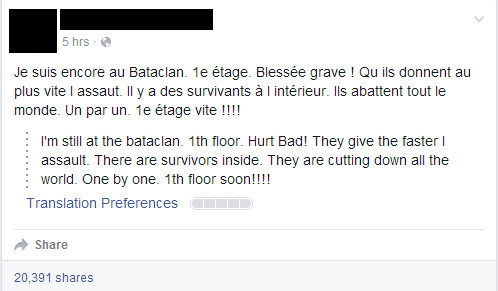Terrorists attacked Beirut (Lebanon) on Thursday killing 46 and Paris (France) on Friday with night killing 158. The attack in Beirut involved a twin bombing. The coordinated attacks in Paris targeted a concert hall, sport stadium and restaurants.
Daesh (ISIS) claimed responsibility through social media for the Beirut attack. A suspect arrested in Paris also told police “I am from ISIS”. Officially security forces and political leaders have refused to say who was responsible. While the attacks were clearly Islamist terrorism, what is in doubt is whether it was coordinated by Daesh or is a result of attacks by lone wolves or other groups which were inspired by Daesh.
Technology has played a critical role connecting victims of terrorism to the public in real time. Hostages in the Bataclan concert hall used text messages and social media to beg the police to raid the venue as they were killed one by one. One hostage wrote on Facebook how the terrorists were advancing towards him killing everyone; the message went viral being shared 20,396 times.
Daesh supporters promoted the attack on Paris through Twitter with #ParisIsBurning, also the name of an influential 1990’s documentary. In some of these Tweets other international cities were mentioned as future targets. Such propaganda, whether centrally coordinated or not, promotes Daesh’s agenda. That agenda includes creating a climate of fear in the general population, generating hostility to Muslims in the West, and making Muslims feel excluded and therefore easier for ISIS to recruit through social media. The attack on Lebanon may also be part of a recruitment strategy. It may have been aimed at stealing potential recruits from another terrorist organisation, Hezbollah, which has a stronghold where the attacks took place.
The dust is still settling, but two thoughts need to be expressed clearly. The first is that we deplore the murders being committed by these extremist groups, we urge all our supporters to stand with the people of Paris and Beirut against this terrorism. The second is that those who are responsible should pay the price, but others who may share a religion, nationality or ethnicity with them should feel safe and welcome in the broader community as they go about their daily lives.
Negative stereotyping of Muslims, which various anti-Muslim groups will seek to promote on social media in light of these attacks, should be reported to the platform providers and to fightagainsthate.com as part of our “Spotlight on Anti-Muslim Internet Hate” campaign. This bigotry targeting an entire segment of the population, not those actually responsible, should be removed from social media. Hate speech on social media has the potential to normalise bigotry in society and we need to prevent that occurring. Our freedom to all go about our daily lives, living in harmony in a multicultural society, is something worth protecting.
Please share to help us spread this message. If you aren’t yet following the Online Hate Prevention Institute on Facebook, please join us.
NOTES
The Online Hate Prevention Institute (OHPI) is Australia’s National Charity dedicated to tackling the problem of online hate including online extremism, cyber-racism, cyber-bullying, online religious vilification, online misogyny, and other forms of online hate attacking individuals and groups in society. We aim to be a world leader in combating online hate and a critical partner who works with key stakeholders to improve the prevention and mitigation of online hate and the harm it causes. Ultimately, OHPI seeks to facilitate a change in online culture so that hate in all its forms becomes as socially unacceptable online as it is in “real life”.

